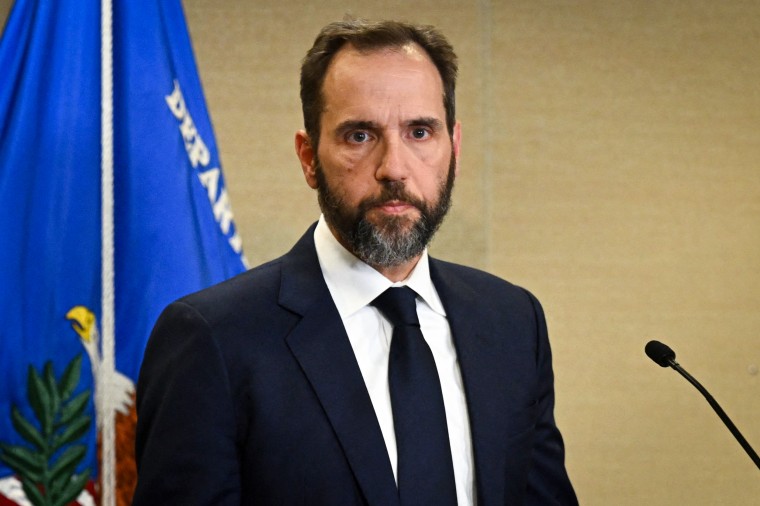Special counsel Jack Smith strongly criticized a recent order by the judge presiding over the case of former President Donald Trump’s alleged mishandling of classified documents, saying that her request for jury instructions from his office and Trump's lawyers is based on a “fundamentally flawed legal premise.”
In a court filing Tuesday, Smith argued that the legal premise behind Judge Aileen Cannon’s request is “wrong” and that it would “distort” the trial, potentially leading to a directed verdict in Trump's favor. The special counsel urged Cannon to “promptly” decide whether the legal premise in question represents a “correct formulation of the law,” and indicated that federal prosecutors would appeal if the judge rules against them.

Cannon last month directed Trump and the special counsel to submit jury instructions framed with two competing scenarios concerning the Presidential Records Act as it relates to the charges brought against Trump under the Espionage Act accusing him of mishandling of classified documents.
The first scenario Cannon outlined allows the jury to review records and determine which documents Trump retained are “personal” or “presidential” under the Presidential Records Act. In the second scenario, Cannon instructed lawyers to draft instructions based on the assumption that presidents have the “sole authority” under that act to lawfully retain documents at the end of their term by declaring them as “personal” or “presidential” records, aligning with Trump’s defense in the case.
“Both scenarios rest on an unstated and fundamentally flawed legal premise — namely, that the Presidential Records Act (‘PRA’), and in particular its distinction between ‘personal’ and ‘Presidential’ records determines whether a former President is ‘authorized,’ under the Espionage Act to possess highly classified documents and store them in an unsecure facility,” Smith's team wrote in the filing.
The Presidential Records Act requires the return of presidential records at the end of a president's term, but says they can keep their personal records, which is described as documents containing “highly personal information, such as diaries, journals, and medical records.”
In a Tuesday filing responding to Cannon's order, Trump's lawyers maintained that the Presidential Records Act gives Trump the authority to decide whether a record is personal or presidential, that all of the records found in his possession could be considered personal despite classification markings, and that that Trump's determination that they're personal records can't be second-guessed by the courts.
One of their proposed jury instructions was for the judge to tell jurors "if President Trump designated a document as a 'personal record' under the Presidential Records Act, then the classification status of that document, if any, is not relevant to your evaluation of whether the government has met its burden of proving beyond a reasonable doubt that the document you are considering is a 'Presidential record.'”
Smith's office said such an instruction would be a grievous mistake and characterized Trump's defense using the Presidential Records Act as pure fiction.
"Trump’s entire effort to rely on the PRA is not based on any facts," prosecutors said. "It is a post hoc justification that was concocted more than a year after he left the White House, and his invocation in this Court of the PRA is not grounded in any decision he actually made during his presidency to designate as personal any of the records charged."
They also noted that while Trump has claimed the documents had been deemed personal while he was president, there's no evidence he'd done so.
"During its exhaustive investigation, the Government interviewed Trump’s own PRA representatives and numerous high-ranking officials from the White House — Chiefs of Staff, White House Counsel and senior members of the White House Counsel’s Office, a National Security Advisor, and senior members of the National Security Council," they wrote. "Not a single one had heard Trump say that he was designating records as personal or that, at the time he caused the transfer of boxes to Mar-a-Lago, he believed that his removal of records amounted to designating them as personal under the PRA. To the contrary, every witness who was asked this question had never heard such a thing," and Trump and his attorneys repeatedly referred to the documents he had possessed as "presidential records" well after he left the White House.
Trump's lawyers, meanwhile, said in their proposed instructions to the jury that to find Trump had "knowingly" taken control of classified documents, the government would have to prove beyond a reasonable doubt that he did so "voluntarily and intentionally and not because of a mistake or by accident."
"Medical science has not yet devised an instrument which can record what was in one’s mind in the distant past," the proposed instructions read. "Rarely is direct proof available to establish the state of one’s mind. State of mind may be inferred from what a person says or does: his words, his actions, and his conduct, as of the time of the occurrence of certain events. The intent with which an act is done is often more clearly and conclusively shown by the act itself, or by a series of acts, than by words or explanations of the act uttered long after the occurrence."
Trump faces multiple charges in the classified documents case, including willful retention of national defense information, false statements and representations, conspiracy to obstruct justice, withholding a document or record and corruptly concealing a document.
The former president has pleaded not guilty to all counts. His co-defendants in the case, Walt Nauta and Carlos De Oliveira, have also pleaded not guilty to related charges. Trump in February moved to dismiss the classified documents indictment in Florida, arguing that on the basis of presidential immunity he cannot be prosecuted.
Cannon last month denied Trump’s motion to dismiss the case as constitutionally vague and expressed skepticism over his lawyers’ argument for tossing out the case based on the Presidential Records Act.

